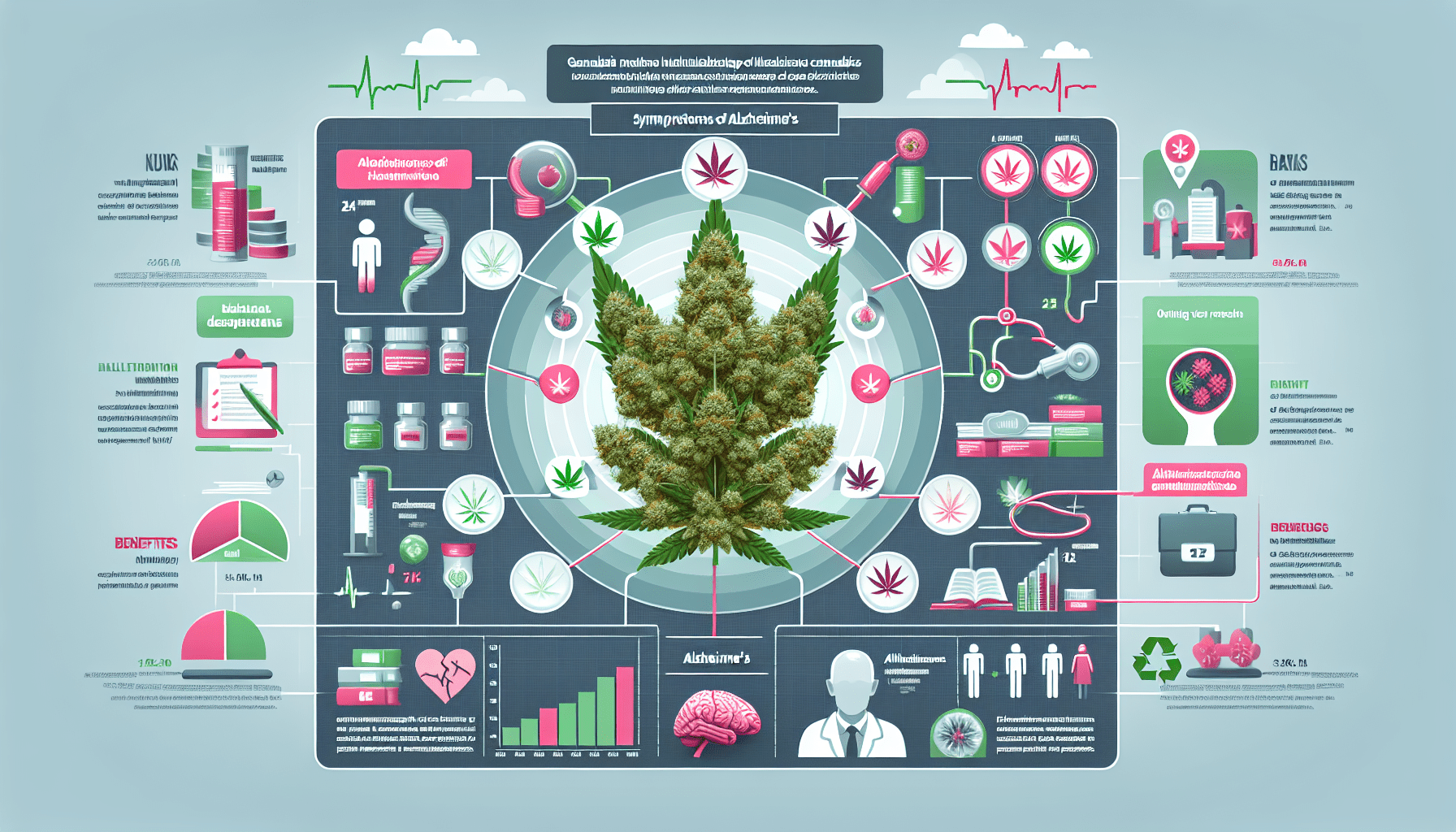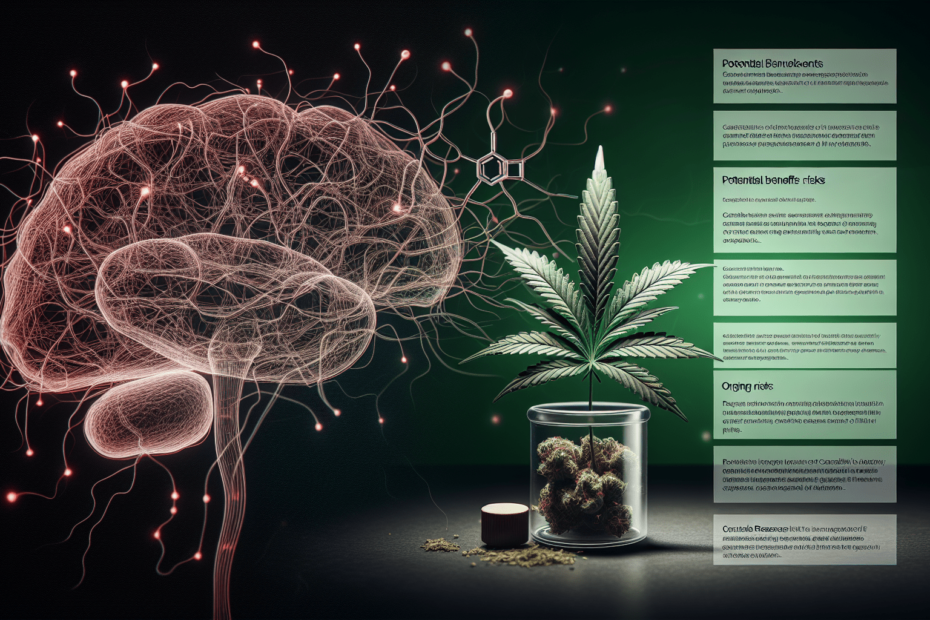Curious about the effects of cannabis on Alzheimer’s symptoms? Look no further! In this article, we’ll explore the potential impact of cannabis on the symptoms of Alzheimer’s disease. Discover the latest research and findings that shed light on the therapeutic properties of this controversial plant. Whether you’re seeking alternative treatments or simply intrigued by the subject, join us as we explore the potential benefits and effects cannabis may have on those living with Alzheimer’s.

Understanding Alzheimer’s Disease
Alzheimer’s Disease is a progressive brain disorder that affects millions of people worldwide. It is the most common form of dementia and primarily affects older adults. The disease is characterized by the gradual decline in memory, thinking, and reasoning skills, eventually leading to severe impairment in daily life activities. Understanding the key aspects of Alzheimer’s Disease is crucial for both patients and caregivers.
What is Alzheimer’s Disease?
Alzheimer’s Disease is a neurodegenerative disorder that leads to the deterioration and death of brain cells. It is named after Dr. Alois Alzheimer, who first identified the disease in 1906. The hallmark characteristics of Alzheimer’s Disease include the accumulation of abnormal protein deposits, specifically beta-amyloid plaques and tau tangles, in the brain. These deposits disrupt the communication between brain cells and eventually cause cell death.
Causes and Risk Factors
While the exact cause of Alzheimer’s Disease is still unknown, several risk factors have been identified. The most significant risk factor is age, with the majority of cases occurring in individuals over 65 years old. Other factors that may increase the risk of developing Alzheimer’s Disease include genetics, family history, certain genes, previous head injuries, cardiovascular conditions, and lifestyle factors such as smoking, poor diet, and lack of physical exercise.
Symptoms and Progression
The symptoms of Alzheimer’s Disease can vary from person to person, but they generally progress slowly over time. In the early stages, individuals may experience memory loss, difficulty with language and problem-solving, mood swings, and confusion. As the disease progresses, the symptoms worsen, leading to severe memory loss, disorientation, difficulty speaking and swallowing, and eventually the inability to perform even simple tasks. The progression of Alzheimer’s Disease is typically categorized into three stages: mild, moderate, and severe. It is important to note that the duration and severity of each stage can vary greatly among individuals.
Cannabis and Alzheimer’s
In recent years, there has been growing interest in the potential benefits of cannabis for Alzheimer’s Disease. Cannabis, also known as marijuana, is a plant that contains numerous chemicals called cannabinoids. These cannabinoids interact with receptors in the brain and body, producing various effects. Research suggests that certain cannabinoids found in cannabis may hold promise for managing symptoms and potentially slowing the progression of Alzheimer’s Disease.
What is Cannabis?
Cannabis is a flowering plant that has been used for both medicinal and recreational purposes for centuries. The plant contains hundreds of chemical compounds, including cannabinoids, terpenoids, and flavonoids. The two main species of cannabis are Cannabis sativa and Cannabis indica, each with its unique properties and effects. Cannabis can be consumed in various forms, including smoking, vaporizing, and ingesting.
Components of Cannabis
The most well-known and researched cannabinoids in cannabis are delta-9-tetrahydrocannabinol (THC) and cannabidiol (CBD). THC is the primary psychoactive compound responsible for the euphoric “high” associated with cannabis use. On the other hand, CBD is a non-intoxicating compound that has gained attention for its potential therapeutic properties. Other cannabinoids, such as cannabinol (CBN), cannabigerol (CBG), and tetrahydrocannabivarin (THCV), also exist in varying quantities in different strains of cannabis.
Importance of Cannabinoids in Alzheimer’s
Research suggests that cannabinoids found in cannabis may play a role in managing the symptoms of Alzheimer’s Disease. The endocannabinoid system (ECS) in the human body consists of cannabinoid receptors, endocannabinoids produced by the body, and enzymes that regulate their activity. The ECS is involved in various physiological processes, including memory, neuroprotection, inflammation, and oxidative stress. Studies have shown that alterations in the ECS occur in Alzheimer’s Disease, which has sparked interest in using cannabinoids to modulate these changes.
Benefits of Cannabis for Alzheimer’s Patients
While more research is needed, preliminary studies and anecdotal evidence suggest that cannabis may offer several potential benefits for Alzheimer’s patients. These include a reduction in agitation, improvement in sleep quality, appetite stimulation, and potential neuroprotective effects. Additionally, cannabis may help alleviate some of the psychological symptoms associated with Alzheimer’s, such as anxiety and depression. However, it is important to note that individual responses to cannabis can vary, and more research is needed to establish the efficacy and safety of cannabis for Alzheimer’s Disease.
Research Studies on Cannabis and Alzheimer’s
Numerous studies have been conducted to investigate the potential effects of cannabis on Alzheimer’s Disease. While the research is still in its early stages, promising findings have emerged that shed light on the potential of cannabis as a therapeutic option for Alzheimer’s patients.
Overview of Existing Studies
Some of the studies have focused on examining the effects of individual cannabinoids on Alzheimer’s-related symptoms and pathological changes, while others have explored the use of whole-plant cannabis extracts. Most of these studies have been conducted on animal models, while a few clinical trials involving humans have also taken place. While the results are promising, it is crucial to conduct more robust and large-scale studies to further validate the findings.
Positive Effects of Cannabis on Alzheimer’s Symptoms
Several studies have reported positive effects of cannabinoids in improving Alzheimer’s-related symptoms. For example, THC has been found to reduce agitation and help with behavioral symptoms associated with Alzheimer’s Disease. CBD, on the other hand, has shown potential in reducing inflammation and oxidative stress, which are thought to contribute to the progression of the disease. Additionally, some studies have observed improvements in cognitive function and memory with the use of certain cannabinoids.
Mechanisms of Action
The mechanisms through which cannabinoids exert their effects on Alzheimer’s Disease are still being investigated. Studies suggest that cannabinoids may reduce inflammation, protect brain cells from oxidative damage, promote the clearance of beta-amyloid plaques, and modulate neurotransmitter activity. These effects could potentially slow down the progression of the disease and alleviate symptoms associated with Alzheimer’s.
Limitations and Controversies
While there are promising findings, it is important to acknowledge the limitations and controversies surrounding the use of cannabis for Alzheimer’s Disease. One of the major challenges is the lack of standardized dosing and administration guidelines. Additionally, the psychoactive effects of THC may be less desirable for some patients, especially the elderly. The long-term effects and potential risks of cannabis use, particularly in older adults, are still not fully understood. Furthermore, legal and ethical considerations surrounding cannabis use add another layer of complexity to the ongoing discussions and research.
Alzheimer’s Symptoms Improved by Cannabis
Cannabis has shown potential in alleviating several symptoms commonly associated with Alzheimer’s Disease. While research is ongoing, preliminary findings suggest that the use of cannabis may have a positive impact on various aspects of the disease.
Memory Enhancement
Memory loss is one of the defining characteristics of Alzheimer’s Disease. Studies conducted on animal models have indicated that certain cannabinoids, such as THC and CBD, may improve memory and cognitive function. These cannabinoids are believed to modulate the activity of brain regions involved in memory formation and retrieval.
Cognitive Function
In addition to memory, cannabis may also have a positive impact on other cognitive functions affected by Alzheimer’s Disease. Clinical observations and anecdotal evidence suggest that cannabis use may help improve attention, problem-solving abilities, and overall cognitive performance in some individuals with Alzheimer’s.
Neuroprotective Effects
One of the potential mechanisms by which cannabis may benefit Alzheimer’s patients is through its neuroprotective properties. Studies have indicated that cannabinoids, particularly CBD, have antioxidant and anti-inflammatory effects, which can protect brain cells from damage and promote their survival. This neuroprotective action could potentially slow down the progression of Alzheimer’s Disease.
Anxiety and Agitation
Many individuals with Alzheimer’s Disease experience symptoms of anxiety and agitation. Cannabis has been shown to have calming and anxiolytic effects, which may help reduce these symptoms in Alzheimer’s patients. THC, in particular, has been found to have a sedative effect that can promote relaxation and reduce anxiety.
Sleep Disorders
Sleep disturbances are common in Alzheimer’s Disease, both for patients and their caregivers. Cannabis has been reported to improve sleep quality and duration in some individuals. The relaxing and sleep-inducing effects of certain cannabinoids may aid in managing sleep problems associated with Alzheimer’s.
Appetite Stimulation
Alzheimer’s patients often struggle with a loss of appetite and weight loss. Cannabis has been shown to stimulate appetite, commonly referred to as the “munchies” effect, which could help improve nutrition and overall well-being in individuals with Alzheimer’s.

Dosage and Administration of Cannabis
The proper dosage and administration of cannabis are crucial for maximizing its potential benefits while minimizing potential risks. Here are some considerations when using cannabis for Alzheimer’s Disease.
Choosing the Right Strain
Different strains of cannabis have varying compositions of cannabinoids, terpenoids, and flavonoids, each with its unique effects. It is important to select a strain that is appropriate for the desired therapeutic outcome. Strains with higher CBD content and lower THC content may be more suitable for individuals with Alzheimer’s, as CBD provides therapeutic benefits without the psychoactive effects associated with THC.
Methods of Administration
Cannabis can be administered in several ways, including smoking, vaporizing, ingestion (edibles), and topical application. Each administration method has its own onset time, duration of action, and potential side effects. Caregivers and patients should discuss the options with healthcare professionals and choose the method that best suits their needs and preferences.
Dosing Guidelines
Currently, there are no standardized dosing guidelines for cannabis use in Alzheimer’s Disease. Determining the appropriate dosage depends on various factors, including individual tolerance, sensitivity, and desired effects. It is generally recommended to start with a low dose and gradually increase it, while closely monitoring the response. Regular communication with healthcare professionals is crucial to ensure safe and effective cannabis use.
Safety and Side Effects
Like any medication, cannabis carries potential side effects and risks. Common side effects include dry mouth, dizziness, increased heart rate, and temporary memory impairment. These side effects are generally mild and transient but can be more pronounced at higher doses or with certain strains. It is important to note that the psychoactive effects of THC can be undesirable for some individuals, particularly those with cognitive impairments. Appropriate monitoring and supervision are advised to ensure the safety of cannabis use for Alzheimer’s patients.
Legal and Ethical Considerations
Before considering the use of cannabis for Alzheimer’s Disease, it is essential to understand the legal and ethical aspects surrounding its use.
Current Legal Status of Cannabis
The legal status of cannabis varies across countries and jurisdictions. While some regions have legalized cannabis for both medical and recreational purposes, others have stricter regulations or even complete prohibition. It is important to be aware of the laws and regulations in your specific location to ensure compliance with legal requirements.
Medical Use and Prescription
In some areas, medical cannabis is legal and can be prescribed by healthcare professionals for specific conditions, including Alzheimer’s Disease. Medical cannabis programs typically require patients to obtain a recommendation or prescription from a qualified healthcare provider. It is advisable to consult with healthcare professionals experienced in cannabinoid therapy to explore the medical use of cannabis for Alzheimer’s.
Ethical Concerns and Discussions
The use of cannabis for Alzheimer’s Disease raises ethical considerations and discussions. Some concerns include the potential for misuse, safe access for patients, the impact on cognitive function, and the implications for vulnerable populations, such as the elderly. Ethical discussions are essential to ensure responsible use, patient autonomy, and the overall well-being of individuals with Alzheimer’s.

The Future of Cannabis in Alzheimer’s Treatment
As research on cannabis and Alzheimer’s Disease progresses, several factors will shape its potential role in the future of treatment.
Ongoing Research
Research on the therapeutic potential of cannabis in Alzheimer’s Disease is still in the early stages. Continued studies are needed to further understand the mechanisms of action, optimal dosing, and long-term effects of cannabis. Robust clinical trials will provide more definitive evidence regarding its efficacy and safety.
Potential Challenges and Roadblocks
There are several challenges and roadblocks that may impede the integration of cannabis into Alzheimer’s treatment. These include the complex legal landscape, limited funding for research, the stigma associated with cannabis use, and the need for standardized guidelines and regulations. Addressing these challenges will be crucial for further advancing cannabis as a potential therapeutic option.
Regulatory Frameworks
As the legal and societal attitudes towards cannabis evolve, the development of comprehensive regulatory frameworks is necessary to ensure the safety and quality of cannabis products. Regulatory bodies will play a pivotal role in establishing guidelines for cultivation, manufacturing, testing, labeling, and distribution of cannabis for medical purposes.
Patient Education and Support
With the potential integration of cannabis into Alzheimer’s treatment, patient education and support will be paramount. It is crucial to provide accurate information about the potential benefits, risks, and limitations of cannabis. Guidance from healthcare professionals and support networks will help patients and their caregivers make informed decisions and navigate the complexities associated with cannabis use.
Case Studies and Personal Experiences
While scientific research provides valuable insights, case studies and personal experiences offer a more human perspective on the impact of cannabis on Alzheimer’s Disease.
Patient Stories
Several individuals with Alzheimer’s Disease have shared their experiences using cannabis as part of their treatment. These stories often highlight improvements in symptoms such as memory, mood, sleep, and overall quality of life. While anecdotal, these accounts contribute to the growing body of evidence regarding the potential benefits of cannabis in Alzheimer’s Disease.
Caregiver Perspectives
Caregivers play a crucial role in the lives of individuals with Alzheimer’s Disease. They have observed firsthand the changes and challenges associated with the disease. Caregiver perspectives on the use of cannabis for Alzheimer’s vary, with some reporting positive outcomes in managing symptoms and others expressing concerns about potential risks and legal implications. Understanding the perspectives of caregivers is essential for developing comprehensive support systems and treatment strategies.
Medical Professional Experiences
Medical professionals have front-line experience and expertise in managing Alzheimer’s Disease. Their experiences with patients who have used cannabis can provide valuable insights into its potential benefits and challenges. Sharing knowledge and best practices among medical professionals will help advance the field and provide evidence-based recommendations for the use of cannabis in Alzheimer’s treatment.

Complementary Therapies
While cannabis shows promise in managing Alzheimer’s symptoms, it is important to consider complementary therapies that can enhance overall treatment outcomes.
Combining Cannabis with Other Treatment Approaches
Cannabis can be used in conjunction with other treatment approaches for Alzheimer’s Disease. Combining cannabis with traditional pharmacological interventions, psychological therapies, and lifestyle modifications may provide a more comprehensive approach to managing the disease. Collaborative and multidisciplinary care is crucial for optimizing treatment outcomes.
Alternative Therapies for Alzheimer’s
In addition to cannabis, other alternative therapies have been explored for Alzheimer’s Disease. These include music therapy, art therapy, aromatherapy, acupuncture, and cognitive training exercises. While the evidence supporting their efficacy is limited, they may offer complementary benefits and improve the overall well-being of individuals with Alzheimer’s.
Potential Synergistic Effects
It is possible that combining cannabis with other complementary therapies may have synergistic effects. For example, the relaxation provided by cannabis may enhance the benefits of meditation or yoga practices. Exploring these potential synergies in a safe and controlled manner may lead to improved outcomes for individuals with Alzheimer’s.
Conclusion
Understanding the potential impact of cannabis on Alzheimer’s Disease requires a comprehensive examination of the available research, case studies, and anecdotal evidence. While the field is still evolving, there is growing evidence to suggest that certain cannabinoids in cannabis may have potential therapeutic benefits in managing symptoms associated with Alzheimer’s Disease. However, further research is needed to establish standardized guidelines, dosing protocols, and safety considerations. The complex legal and ethical landscape surrounding cannabis use adds another layer of complexity to the ongoing discussions. The integration of cannabis into Alzheimer’s treatment should be approached with caution, consideration of individual circumstances, and collaboration among healthcare professionals, caregivers, and patients. Looking ahead, ongoing research and advancements in regulatory frameworks will shape the future of cannabis as a potential therapeutic option for Alzheimer’s Disease.

